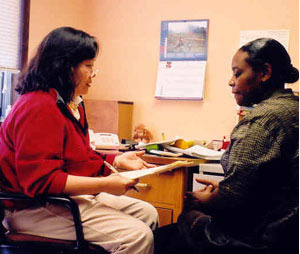 In this installment, I would explore a very basic question; “Just what can we expect to accomplish in the life of a homeless addict during their stay at a rescue mission program?” The answer comes from recognizing some basic needs that need to be addressed so those we work can develop productive, satisfying sober lives.
In this installment, I would explore a very basic question; “Just what can we expect to accomplish in the life of a homeless addict during their stay at a rescue mission program?” The answer comes from recognizing some basic needs that need to be addressed so those we work can develop productive, satisfying sober lives.
The answer comes from recognizing some basic needs that need to be addressed so those we work can develop productive, satisfying sober lives. The goal of a written recovery plan is to set down these goals, in order of priority, and then develop a strategy for working through them while in the program. This plan, then, becomes the basic road map for the counseling process with the individual. Weekly one-on-one sessions should always begin with revisiting the written plan and discovering what progress has been made toward accomplishing its jointly agreed upon goals
A. Help Addicts to Overcome Denial – Twelve Step groups recognize that recovery does not begin until the addict accepts the reality of his or her personal state of powerlessness. We need to assist clients to move beyond an intellectual acknowledgement that alcohol and/or drugs are the cause of their problems. They need a deep inner knowing that they are completely and absolutely powerlessness over their “drug of choice.” Powerlessness means, essentially that the user cannot predict the out come of even the most limited using experiences. Until this happens, “recovery” will remain and intellectual exercise without ever getting into the heart. They will always have the illusion of “controlled use” and the option to return to it when the inevitable pain that is an integral aspect of recovery begins. The term “hitting bottom” is often used to describe the experience of surrender to the reality of the addict’s sense of personal powerlessness. A peer-centered First Step therapy group strategy can be used to bring the bottom up to the addict.
B. Help Clients to Establish a Personal Program of “Self-Care” — We need to help them to answer the question “What must I do to maintain a growing personal program of recovery and spiritual growth?” Personal self-care includes learning the disciplines of the Christian list, along with fellowship with other recovering people, avoiding negative relationships, learning not to “stuff” feelings, practicing “rigorous honesty,” hygiene, exercise, etc. This is an important issue because shame is a major factor in addiction. Often the addict’s shame-based self concept says, “I don’t deserve to be taking care of.” Instead, our goal is to help him understand that, because of what Christ has done, we indeed are loved made worthy of care.
C. Help Them to Become Integrated into a Supportive Community- Establishing accountability, fellowship, and hope through both support groups (recovering community) and the church (spiritual community). It is critical that we have definite strategies for moving our clients into the local church. This is where an on-going relationship with a Christian support group can be a great help.
D. Help Clients to Gain Necessary “Life Skills” — These may include:
- Ability to handle and reduce feelings of stress
- Decision making skills
- Ability to assert oneself
- Parenting skills
- Financial and other planning skills
- Physical maintenance skills (nutrition and physical hygiene)
- Ability to delay gratification
- Ability to access community resources
- Ability to identify and reduce negative feelings (e.g. guilt, resentment, hate and fear)
- Understanding of the basic spiritual principles of Christian discipleship (i.e. prayer, Bible study, fellowship, etc.)
- Basic relationship skills; honesty, healthy expression of feelings, self-awareness, detachment and other codependency issues
- Vocational skills – basic education, healthy work attitudes, marketable skills, job search skills, etc.
- Getting medical help for drug related and other physical problems. Whenever possible, each client should receive a medical screening before beginning a recovery program.
- Addressing psychological problems. The term “dual diagnosis” is often used to describe individual who has genuine problems with mental illness combined with an addiction to drugs and/or alcohol.
- Developing adequate living arrangements (housing and food, etc.) once the client has completed the recovery program.
Rarely are all of these services provided at the mission itself. Therefore, it is very important to develop a network of trusted referral resources. With referrals be sure to develop a system of feedback to the mission from the referral agency about what services are being rendered to the mission’s clients. Using a formal “Release of Information” form is usually necessary. When using outside support groups, a card may be signed by the group’s leader to document the mission client’s attendance.
For downloadable forms and other helpful information for creating recovery plans, see the Guide to Effective Rescue Mission Recovery Programs.
For the rest of this series go to the Organizing the Counseling Process Index

 In the past thirty years of my work, I have had the opportunity to visit many facilities that help the homeless. When I see a man in a recovery program I like to ask, “How is he doing?” I usually just get a pat answer like, “Well, he’s been with us for six months.” The problem with this answer, of course is that a sober, healthy lifestyle is not automatically picked up just by hanging around the mission for a certain length of time.
In the past thirty years of my work, I have had the opportunity to visit many facilities that help the homeless. When I see a man in a recovery program I like to ask, “How is he doing?” I usually just get a pat answer like, “Well, he’s been with us for six months.” The problem with this answer, of course is that a sober, healthy lifestyle is not automatically picked up just by hanging around the mission for a certain length of time. The primary distinctives that differentiate Christian Recovery from other approaches to life change lie in our approach to spirituality. Here are some of the major theological tenants of the Christian approach to recovery.
The primary distinctives that differentiate Christian Recovery from other approaches to life change lie in our approach to spirituality. Here are some of the major theological tenants of the Christian approach to recovery.

